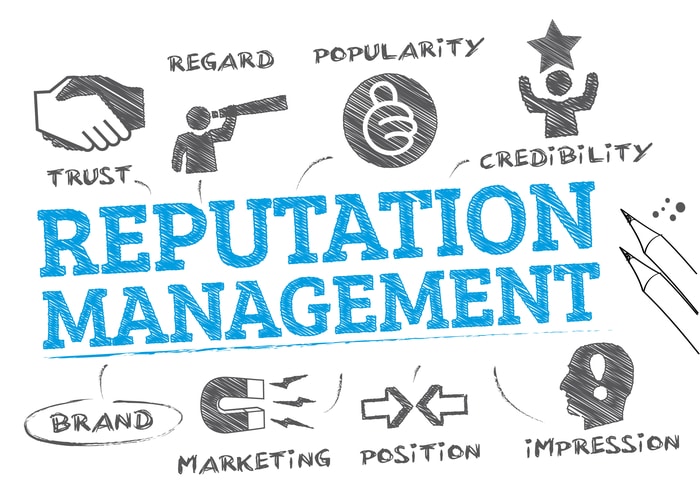Reputation Management Proficiency: Approaches for Effective Brand Name Control
Wiki Article
From Situation to Possibility: Leveraging Track Record Monitoring in Times of Adversity
In today's fast-paced and interconnected globe, businesses and individuals deal with the consistent threat of situations and adversities that can potentially damage their hard-earned credibility. In this conversation, we will certainly check out the art of leveraging track record monitoring throughout times of situation, using understandings and approaches that can change a tough scenario into a tipping stone for success.Recognizing Online Reputation Management
Comprehending track record monitoring is essential for individuals and services seeking to maintain a positive public image and minimize prospective damage in times of adversity. Track record management includes the methods and strategies made use of to form, preserve, and safeguard a person's or company's track record (Reputation Management). It entails proactively monitoring what is being said concerning the private or company, both online and offline, and responding properly to any kind of damaging or adverse infoIn today's digital age, where info spreads rapidly and can have a long lasting impact, reputation management has actually come to be also much more important. Social media site platforms, on-line review websites, and news electrical outlets can rapidly intensify any type of adverse publicity or objection, potentially triggering significant injury to a person's or company's credibility. By recognizing reputation administration, organizations and individuals can successfully browse these difficulties and proactively attend to any kind of problems that might arise.
Secret parts of reputation administration consist of monitoring on the internet evaluates and states, involving with customers or stakeholders, dealing with unfavorable responses or objection in a timely and professional way, and actively taking care of online accounts and content. In addition, people and services must strive to construct a strong track record by supplying on pledges, supplying superb customer solution, and participating in moral techniques.
Recognizing Adversities and Dilemma Scenarios

To determine these adversities and situation situations, companies need to establish a durable tracking and very early warning system. This involves proactively keeping track of typical media, social networks platforms, on-line forums, and various other appropriate resources for any type of possible risks or adverse conversations associated with the organization. Reputation Management. By staying proactive and alert, companies can rapidly react and find to arising concerns, preventing them from spiraling out of hand
Additionally, organizations must also carry out normal risk analyses to determine prospective susceptabilities and powerlessness in their operations. When they do occur, this enables them to establish backup plans and methods to resolve crises successfully. By being prepared and proactive in identifying misfortunes and situation scenarios, organizations can better secure their track record, preserve stakeholder trust fund, and ultimately turn misfortune right into possibility.
Building a Crisis Feedback Strategy
Developing an effective crisis response strategy is essential for organizations to efficiently browse via difficulty and protect their reputation. In times of crisis, organizations must be prepared to react rapidly and properly to minimize the influence on their stakeholders and keep public trust. Building a crisis response approach entails a number of essential steps.To start with, companies need to establish a situation administration team included key people from different divisions. This team should be in charge of implementing the situation and developing reaction plan. They should have a clear understanding of the company's values, purposes, and key stakeholders.
Second of all, organizations should perform an extensive threat evaluation to recognize prospective crises that might occur and analyze their prospective impact. browse around this web-site This includes assessing external and inner aspects that could bring about a dilemma, such as functional disruptions, economic problems, or reputational threats.
Following, organizations need to create an interaction plan that outlines exactly how they will interact with their stakeholders during a crisis. This strategy must consist of regular and clear messaging, as well as systems and channels to reach various target markets.
Additionally, organizations need to develop protocols for tracking and evaluating the crisis action approach. This includes on a regular basis upgrading the plan and evaluating to guarantee its performance and making essential modifications based upon lessons gained from previous crises.

Using Social Media Site in Reputation Administration
Social media site has ended up being an essential device for companies in managing their track record throughout times of adversity. With the rise of social networking platforms such as Facebook, Twitter, and Instagram, companies now have the chance to straight engage with their stakeholders and attend to any kind of concerns or problems that may develop.Throughout times of crisis, social networks permits companies to quickly distribute information, offer updates, and interact their side of the tale. By actively taking part in social media conversations, organizations can keep track of public sentiment, address misinformation, and demonstrate transparency and responsibility.
One of the crucial advantages of using social networks in credibility administration is the capability to reach a big audience in real-time - Reputation Management. Through social networks platforms, organizations can involve with stakeholders from around the world, despite geographical limits. This allows them to not only manage their credibility locally but also on a worldwide scale
Another advantage of making use of social networks is the interactive nature of these systems. Organizations can actively listen to their target market, react to their issues, and demonstrate a desire to solve problems. This degree of involvement aids construct count on and reputation, which are crucial for reputation administration.
However, it is vital for companies to approach social media with care. Mistakes or inappropriate feedbacks can swiftly escalate a situation and more damage the company's track record. It is essential for companies to have a well-defined social media approach in location, with clear guidelines on how to resolve crisis scenarios.
Turning Situation Into Opportunity: Situation Researches
Numerous organizations have actually efficiently turned situations into possibilities by efficiently handling their reputation and executing tactical actions. These case research studies highlight the relevance of proactive track record management Read More Here during times of misfortune.One such case research study is the Tylenol situation in 1982. By focusing on customer safety and security and honestly dealing with the situation, Johnson & Johnson not only gained back customer depend on however also set new market criteria for product safety.
One more noteworthy example is the Domino's Pizza situation in 2009. In reaction, Domino's right away apologized and released a detailed online campaign to address the situation.
These study show the importance of speedy activity, transparency, and effective interaction consequently crises right into opportunities. By effectively handling their credibility and applying tactical activities, organizations can not news just reduce the adverse impacts of a dilemma yet also arise more powerful and a lot more resilient.
Conclusion
In times of misfortune, online reputation management plays an important function in companies' survival and success. By understanding the importance of credibility administration, determining dilemma scenarios, and structure reliable response strategies, companies can efficiently navigate with tough times. Leveraging social media sites as a device in track record monitoring can better boost companies' capability to resolve dilemmas and communicate with stakeholders. With proactive and critical reputation management, situations can be developed into possibilities for development and enhancement.By being prepared and aggressive in determining hardships and crisis circumstances, companies can better shield their credibility, maintain stakeholder depend on, and eventually turn misfortune into chance.
Establishing an efficient crisis action method is important for companies to effectively browse with hardship and shield their credibility. Missteps or improper responses can swiftly escalate a dilemma and more damages the organization's online reputation. Leveraging social media as a tool in track record monitoring can even more improve companies' ability to attend to situations and communicate with stakeholders. With aggressive and tactical track record monitoring, crises can be turned into chances for growth and enhancement.
Report this wiki page